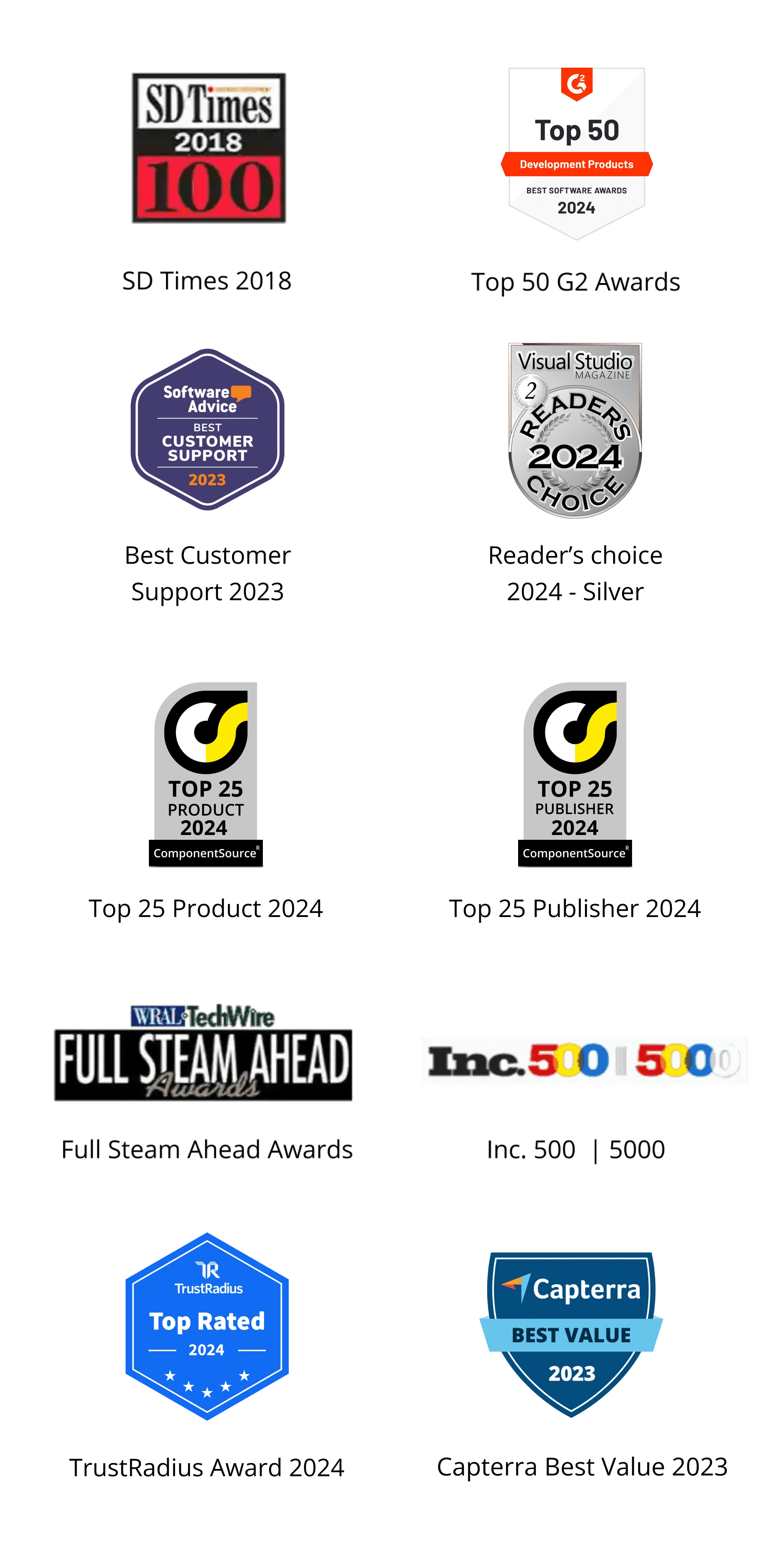Trusted by the world’s leading companies

Overview
The ASP.NET MVC TreeView is a graphical user interface control that to represents hierarchical data in a tree structure. It provides great performance with its advanced features like load on demand, checkbox support, multiple selection, tree navigation, drag and drop, tree node editing, and template support.
Why choose Syncfusion Essential Studio® ASP.NET MVC TreeView?
High performance
Load on demand (lazy load) is enabled by default to reduce bandwidth usage when consuming large amounts of data. Only first-level nodes are loaded initially, and then child nodes are loaded when their parent node is expanded.
Seamless data binding
Bind data to the TreeView component from any valid data source in JSON format. The tree data can be local or remote and retrieved via various adapters, such as OData, OData V4, URL, JSON, and web API.
Adapts to any resolution
TreeView has a highly responsive layout and an optimized design for desktops, touchscreens, and phones. It works well on all mobile phones that use iOS, Android, or Windows OS.
Admirable feature set
The ASP.NET MVC TreeView supports load on demand, bound and unbound modes, drag and drop, multiselection, and editing.
Create your own template designs
It can be customized via node template support, which allows you to design a custom structure for tree nodes. Node templates can be used for parent nodes, child nodes, or both, and can include images and any custom element structure.
Visualize hierarchical data
The ASP.NET MVC TreeView is a graphic user interface element that displays hierarchical data as a tree structure. It can be populated with nested arrays of JSON objects from a hierarchical data source.
Attractive, customizable themes
Cutting-edge design with several built-in themes, such as Fluent, Tailwind CSS, Bootstrap, Material, and Fabric. Utilize the online Theme Studio tool to customize themes of treeview easily.
Globalization and localization
Enable users from different locales to use the component by formatting dates, currency, and numbering to suit preferences.
ASP.NET MVC TreeView Code Example
Easily get started with the ASP.NET MVC TreeView using a few simple lines of C# code as demonstrated below. Also explore our ASP.NET MVC TreeView Example that shows you how to render and configure the TreeView in ASP.NET MVC.
@using Syncfusion.EJ2.Navigations
@Html.EJS().TreeView("listdata").Fields(field=>
field.Id("id").ParentID("pid").Selected("selected").
Expanded("expanded").Text("name").HasChildren("hasChild")
.DataSource(ViewBag.dataSource)).Render()public partial class TreeViewController : Controller
{
TreeViewFieldsSettings fields = new TreeViewFieldsSettings();
public ActionResult DefaultFunctionalities()
{
List<object> listdata = new List<object>();
listdata.Add(new
{
id = 1,
name = "Australia",
hasChild = true,
expanded = true
});
listdata.Add(new
{
id = 2,
pid = 1,
name = "New South Wales",
});
listdata.Add(new
{
id = 3,
pid = 1,
name = "Victoria"
});
listdata.Add(new
{
id = 4,
pid = 1,
name = "South Australia"
});
listdata.Add(new
{
id = 6,
pid = 1,
name = "Western Australia",
});
listdata.Add(new
{
id = 7,
name = "Brazil",
hasChild = true
});
listdata.Add(new
{
id = 8,
pid = 7,
name = "Paraná"
});
listdata.Add(new
{
id = 9,
pid = 7,
name = "Ceará"
});
listdata.Add(new
{
id = 10,
pid = 7,
name = "Acre"
});
listdata.Add(new
{
id = 11,
name = "China",
hasChild = true
});
listdata.Add(new
{
id = 12,
pid = 11,
name = "Guangzhou"
});
listdata.Add(new
{
id = 13,
pid = 11,
name = "Shanghai"
});
listdata.Add(new
{
id = 14,
pid = 11,
name = "Beijing"
});
listdata.Add(new
{
id = 15,
pid = 11,
name = "Shantou"
});
listdata.Add(new
{
id = 16,
name = "France",
hasChild = true
});
listdata.Add(new
{
id = 17,
pid = 16,
name = "Pays de la Loire"
});
listdata.Add(new
{
id = 18,
pid = 16,
name = "Aquitaine"
});
listdata.Add(new
{
id = 19,
pid = 16,
name = "Brittany"
});
listdata.Add(new
{
id = 20,
pid = 16,
name = "Lorraine"
});
listdata.Add(new
{
id = 21,
name = "India",
hasChild = true
});
listdata.Add(new
{
id = 22,
pid = 21,
name = "Assam"
});
listdata.Add(new
{
id = 23,
pid = 21,
name = "Bihar"
});
listdata.Add(new
{
id = 24,
pid = 21,
name = "Tamil Nadu"
});
ViewBag.dataSource = listdata;
return View();
}
}![]()
Tree node with icons
Display nodes with labels and icons to present the content in a more readable format. This is helpful in making a typical directory tree and file system.
Checkbox
The ASP.NET MVC TreeView control provides built-in support for checkboxes, allowing users to select more than one item.
The TreeView checkbox has a tri-state mode also, which is applicable only for parent nodes. In this mode, the parent node will go into the indeterminate state when the child nodes are partially checked.

Drag and drop
In ASP.NET MVC TreeView, nodes can be reordered by simply dragging and dropping them.
Inside the tree
Tree nodes can be dragged and dropped from one parent node to another within the same level or at different levels.
Outside the tree
Extending the drop behavior allows users to drop tree nodes from one TreeView to another.
External container
Drop tree nodes to any external container or component by extending the TreeView node drop action.
Multiple node selection
The ASP.NET MVC TreeView control allows users to select multiple nodes. When the drag-and-drop feature is enabled, all the selected nodes can be dragged at the same time.



Editable nodes
Edit the tree nodes’ label text on the client side by double-clicking it. When editing TreeView nodes, the TreeView data source will also be updated with the modified data.
Sorting tree nodes
Render the ASP.NET MVC TreeView nodes in the ascending or descending order based on the label text for improved readability.


Node template
The ASP.NET MVC TreeView control can be customized through its node template support, which allows defining a custom structure for tree nodes. You can use node templates specifically for parent nodes, child nodes, or both, and include images and any custom element structure.
Expand collapse icons
Easily customize the expand and collapse icons in ASP.NET MVC TreeView based on the requirement of your application.
![]()

Context menu
Integrate a context menu into ASP.NET MVC TreeView to perform node manipulations such as adding, removing, and renaming nodes.
Text wrap
A node’s text wraps when it reaches edge of the TreeView. The node’s height will adjust automatically based on the content.


Customization by node level
Customize the tree nodes based on their level, such as leaf nodes, sibling nodes, first-level nodes, and second level nodes.
Node validation
Add validation to the labels of tree nodes on editing, like a minimum or maximum length.


Tooltips for tree nodes
It supports tooltips for tree nodes that display information about the nodes while hovering over them. You can bind a tooltip from a data source along with node fields.
Accessibility
The ASP.NET MVC TreeView component is easily accessed by screen readers. Complete keyboard interaction support has also been provided.

Keyboard navigation
The ASP.NET MVC TreeView component ensures that every cell is accessible using the keyboard. Major features like sort, select, and edit can be performed using keyboard commands alone; no mouse interaction is required. This helps in creating highly accessible applications using this component.

Screen reader
The ASP.NET MVC TreeView has complete WAI-ARIA accessibility support. The Data Grid UI includes high-contrast visual elements that help visually impaired people to have the best viewing experience. Also, valid UI descriptions are easily accessible through assistive technologies such as screen readers.

Right to left (RTL)
Right-to-left rendering allows displaying the text and layout of the ASP.NET MVC TreeView from right to left. This improves the user experience and accessibility for RTL languages.
Other supported frameworks
TreeView is also available in Blazor, Angular, React, and Vue frameworks. Check out the different TreeView platforms from the links below,
Supported browsers
The ASP.NET MVC TreeView works well with all modern web browsers such as Chrome, Firefox, Microsoft Edge, Safari, and Opera.

Not sure how to create your first ASP.NET MVC TreeView? Our documentation can help.
I’d love to read it now140+ ASP.NET MVC UI CONTROLS
Frequently Asked Questions
Why should you choose Syncfusion Essential Studio® ASP.NET MVC Tree View?
The Syncfusion ASP.NET MVC Tree View provides the following features:
- Display hierarchical data in a tree-view structure.
- Load a wide range of nodes with optimal performance.
Flexible data binding with support to use local and remote data sources such as JSON, RESTful services, OData services, and WCF services.
Drag and drop multiple selected tree nodes anywhere.
Select multiple nodes using built-in check boxes.
Edit node text in-line with editable nodes support.
Easily customize nodes, expand icons, and collapse icons.
- One of the best ASP.NET MVC Treeview in the market that offers feature-rich UI to interact with the software.
- Simple configuration and API.
- Supports all modern browsers.
- Mobile-touch friendly and responsive.
Expansive learning resources such as demos and documentation to learn quickly and get started with ASP.NET MVC Tree View.
Where can I find the Syncfusion ASP.NET MVC Tree View demo?
You can find our ASP.NET MVC Tree View demo, which demonstrates how to render and configure the TreeView.
Can I download and utilize the Syncfusion ASP.NET MVC Tree View for free?
No, this is a commercial product and requires a paid license. However, a free community license is also available for companies and individuals whose organizations have less than $1 million USD in annual gross revenue, 5 or fewer developers, and 10 or fewer total employees.
How do I get started with Syncfusion ASP.NET MVC Tree View?
A good place to start would be our comprehensive getting started documentation.
Our Customers Love Us


 Documentation
Documentation
Awards
Greatness—it’s one thing to say you have it, but it means more when others recognize it. Syncfusion® is proud to hold the following industry awards.




















